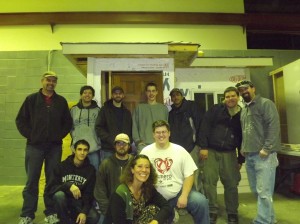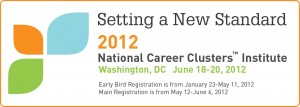
 Deanna Lewis serves as the Director for Career & Certification Services with the Home Builders Institute (HBI). Prior to joining HBI’s family in 2001, Lewis’ experiences included teaching at the elementary level where she developed a customized curriculum for transitional first grade students; managing the tri-state (Pennsylvania, New Jersey & Delaware) satellite office of the New York Times; and conducting test score interpretation as a consultant for the College Board.
Deanna Lewis serves as the Director for Career & Certification Services with the Home Builders Institute (HBI). Prior to joining HBI’s family in 2001, Lewis’ experiences included teaching at the elementary level where she developed a customized curriculum for transitional first grade students; managing the tri-state (Pennsylvania, New Jersey & Delaware) satellite office of the New York Times; and conducting test score interpretation as a consultant for the College Board.
During a recent visit, my plumber said, “I love my job!†as he was patiently answering my hundred and one questions without slowing down on the task at hand (he was getting paid by the hour). He said this before he gave me the bill. I’m sure he was enjoying his job even more as I wrote the check.
His comment, “I love my job,†left an impression on me. I began to wonder what happened to the passion tradesmen and women used to have for their jobs. That sense of excitement about learning plumbing systems or the concept that a carpenter’s work is his or her art. Is that passion still out there?
Will the Workforce be Ready?
It is predicted that by 2014 careers in the Architecture and Construction Career Cluster will start to resume employment levels like those seen in 2007 and will exceed 2007 levels in 2015.[1] Will the industry have a workforce prepared to meet the demands? Carpenters are listed as one of the 30 occupations with the largest employment growth from 2008-18. The profession is categorized as requiring long-term on-the-job training.[2] Are there a sufficient number of trainees to fill the future demand?
Industry Opportunities – Choosing the Right Path
Construction offers opportunities at every level. It is an industry that still has career opportunities following high school. That does not imply that training stops at that point. Instead, it indicates there are still on-the-job training opportunities available. There are also certificate and two-year programs offered at technical schools and community colleges. For management-level positions, many companies will require a four-year degree.
That being said, it is predicted that overall, 34 percent of the jobs in the Architecture and Construction Career Cluster™ will require at least some postsecondary education and training by 2018.[1] Now is the time to engage youth. Inform them about the educational requirements to be successful in the industry. HBI currently offers a first step to professionalism through its student certification program, which sets the stage for stackable credentials.[4] The National Association of State Directors of Career Technical Education Consortium (NASDCTEc) also provides information about the Architecture and Construction Career Cluster™ at http://www.careertech.org/career-clusters/landing-pages/architecture.html.
Educators Making a Difference
Career Technical Education (CTE) has programs in nearly 1,300 public high schools and 1,700 two-year-colleges[3]. HBI is a strong supporter of CTE because it meets our members’ needs and helps students, of all ages, become college and career ready so they have a lifetime of success. CTE programs do an excellent job preparing students for the industry opportunities identified above, but it is clear that instructors go far beyond just preparing students to work.
 Stan Sluzenski’s students are bound to be on the right path to becoming industry professionals. Sluzenski, a Building Trades Instructor at St. Croix Regional Technical Center in Calais, Maine, utilizes his resources well to help his students gain respect and experience. He said, “As a teacher, I encounter the need for skilled workers from many different sources, including my local advisory board, community members and industry recruiters.”
Stan Sluzenski’s students are bound to be on the right path to becoming industry professionals. Sluzenski, a Building Trades Instructor at St. Croix Regional Technical Center in Calais, Maine, utilizes his resources well to help his students gain respect and experience. He said, “As a teacher, I encounter the need for skilled workers from many different sources, including my local advisory board, community members and industry recruiters.”
 The Spokane Home Builders Association in Spokane, Washington, is celebrating 31 years of changing lives and building futures. Kim Waseca-Love, Education/Apprenticeship Director captured the spirit of their program when she said, “Carpentry allows us to express our creative spirit.†Waseca-Love goes on to say, “We also know the feeling of accomplishment that we have when we look at our completed work.†She feels the instructors are the apprenticeship program’s key ingredient. “It is because of their qualifications and passion for the trade that our students are able to acquire all the educational opportunities they need to climb as high as they wish on the residential construction industry’s ladder of success.â€
The Spokane Home Builders Association in Spokane, Washington, is celebrating 31 years of changing lives and building futures. Kim Waseca-Love, Education/Apprenticeship Director captured the spirit of their program when she said, “Carpentry allows us to express our creative spirit.†Waseca-Love goes on to say, “We also know the feeling of accomplishment that we have when we look at our completed work.†She feels the instructors are the apprenticeship program’s key ingredient. “It is because of their qualifications and passion for the trade that our students are able to acquire all the educational opportunities they need to climb as high as they wish on the residential construction industry’s ladder of success.â€
Educators such as Sluzenski and Waseca-Love are leading the charge for a knowledgeable workforce by making sure students interested in the construction industry know…
- The difference between just a job and a career
- How and where to look for employment following high school
- The reason for advancing skills after high school
- The postsecondary educational opportunities that are available
- How to access the various types of postsecondary training
Just as important, though, they are instilling in their students a crucial passion for the work. It takes time to become a skilled professional in the construction industry. Hopefully, there will be many reaching that status who will chime in with the words . . . “I love my job!â€
The Friends of CTE Guest Blog Series provides advocates – from business and industry, researchers and organizations – an opportunity to articulate their support for Career Technical Education. The monthly series features a guest blogger who provides their perspective on and
experience with CTE as it relates to policy, the economy and education.
Are you interested in being a guest blogger and expressing your support for CTE? Contact Melinda Findley Lloyd, Communications Consultant, at [email protected].
[1] The Georgetown University Center on Education and the Workforce, “Career Clusters: Forecasting Demand for High School through College Jobs 2008-2018â€, Georgetown University, November 2011. http://www9.georgetown.edu/grad/gppi/hpi/cew/pdfs/clusters-complete-update1.pdf
[2] United States Department of Labor, Bureau of Labor Statistics, Economic and Employment Projections Table 7. The 30 fastest-growing occupations, 2008-18, December 2009. http://www.bls.gov/news.release/ecopro.toc.htm
[3] National Center for Education Statistics.
[4] Home Builders Institute, http://www.hbicertification.org













